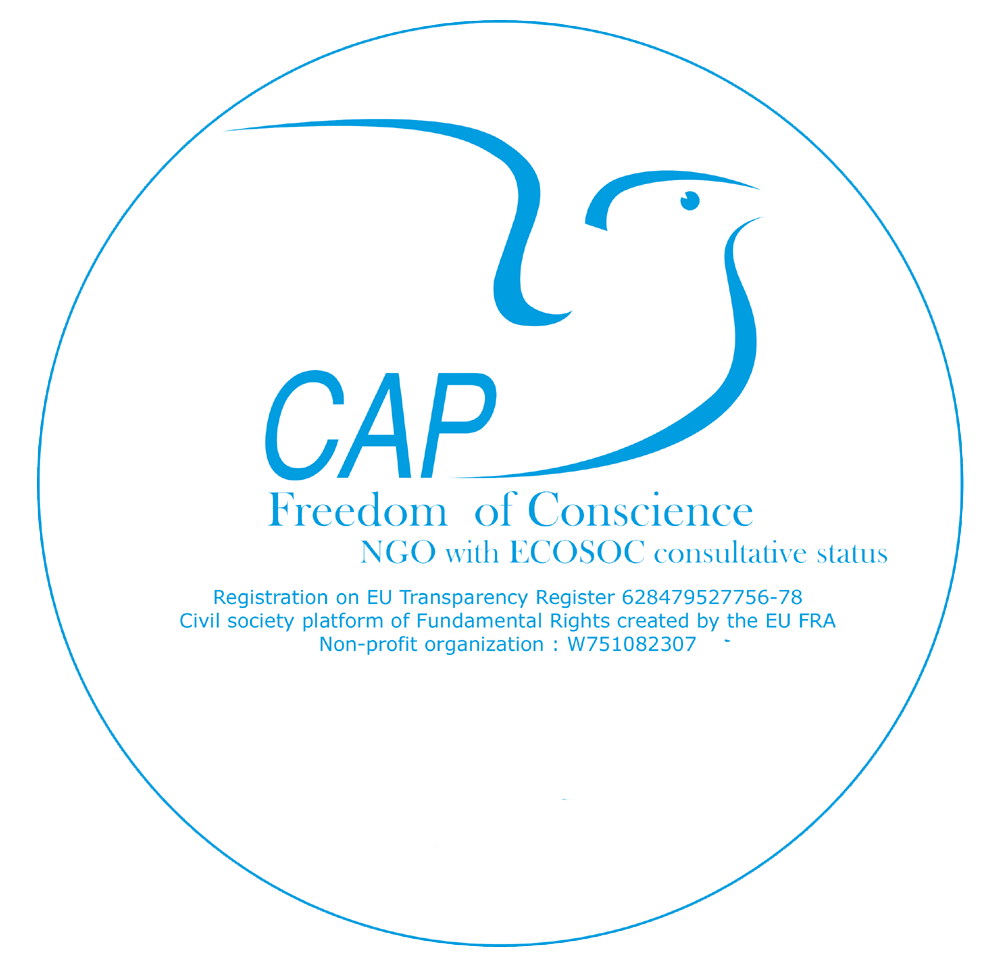Faith & Freedom Summit III
HOW FAITH-BASED ORGANIZATIONS TACKLE ISSUE THAT ARE AFFECTING CITIZENS IN EUROPE
WHEN: 18 April 2024, 14:30 – 18:00
European Parliament (Brussels)
ROOM: SPAAK 1C47 (BRU)
By Thierry Valle CAP Liberté de Conscience
First of all I would like to thank Mrs Maxette Pirbakas MP and the organisers of this 3rd Faith and Freedom summit for inviting me to give you a presentation on the theme of “the social action of Faith-Based Organizations”. I would like to take you on a journey through time, exploring the profound impact of Faith-Based organisations in promoting peace and social equality from the 15th century to the present day.
I decided to begin my presentation of the influence of the Faith Based Organizations in Europe at the time of the Renaissance because, during this pivotal period, the influence of religious institutions extended far beyond the realm of spirituality, shaping societal norms, encouraging unity and advocating justice.
The Renaissance period of the 15th century marked a significant shift in religious values, with the rise of Humanist thought. The Humanists, influenced by the ideals of the classical world, championed the inherent dignity of the individual and the pursuit of knowledge. This intellectual movement paved the way for a more nuanced understanding of the role of religion in society.
In the 15th century, the Catholic Church, as the dominant religious force in Europe, played a significant role in mediating conflicts and promoting peace. The papacy often acted as a diplomatic intermediary, seeking to resolve disputes between warring nations and advocating for peaceful resolutions. The Council of Constance, held in the early 15th century, aimed to heal the Great Schism within the Church and restore unity, thereby contributing to the stability of the region.
As the Reformation swept across Europe in the 16th century, the emergence of Protestant denominations brought new perspectives on social equality and individual rights. The teachings of Martin Luther and other reformers challenged the established hierarchies and emphasized the inherent dignity of all human beings. This ideological shift paved the way for greater social mobility and the empowerment of the common people.
In the 17th century, the Quakers, a religious movement founded by George Fox, became a driving force for peace and social justice. Their commitment to pacifism and non-violence, as well as their advocacy for the abolition of slavery and the equal treatment of all individuals, regardless of race or gender, left an indelible mark on society. The Quakers’ efforts to promote peace and equality inspired subsequent movements and influenced the development of human rights principles.
The 18th century witnessed the rise of the Enlightenment, a philosophical movement that championed reason, individual liberty, and the pursuit of knowledge. While not directly affiliated with religious organizations, the Enlightenment thinkers drew inspiration from various religious traditions, advocating for tolerance, freedom of thought, and the inherent equality of all human beings. This intellectual movement laid the foundation for the subsequent fight against oppression and the promotion of universal human rights.
In the 19th century, religious organizations played a pivotal role in addressing social inequalities and advocating for the rights of marginalized communities. The abolitionist movement, which sought to abolish slavery, was heavily influenced by Christian principles of human dignity and equality. Religious leaders such as William Wilberforce and Frederick Douglass, inspired by their faith, tirelessly campaigned against the inhumane practice of slavery, ultimately leading to its abolition in various parts of the world.
Furthermore, the 19th century witnessed the emergence of social reform movements driven by religious organizations. The Catholic Church, through its encyclicals and the work of influential figures like Pope Leo XIII, addressed the plight of workers and advocated for just labor conditions and the protection of human rights. Protestant denominations, such as the Methodists and Baptists, played a significant role in promoting education, social welfare, and the empowerment of women.
At the turn of the 20th century, Spiritism emerged as a significant religious and social movement in Europe, particularly in France. Spiritist beliefs, which centered around communication with the spirit world, inspired a wave of social reform and progressive ideals. Spiritist thinkers and practitioners advocated for the emancipation of women, the abolition of slavery, and the improvement of living conditions for the working class. Figures like Allan Kardec, the founder of Spiritism, used their platforms to challenge traditional power structures and promote greater equality and social justice. The Spiritist movement’s emphasis on individual enlightenment and the interconnectedness of all beings contributed to a more inclusive and egalitarian vision for society during this transformative period.
From the 20th century onwards, the emergence of new religious movements has had a significant impact on European society, both positively and negatively. Despite facing attacks and criticism, these movements have responded to the evolving challenges facing society in unique and influential ways.
These new religious movements have responded to the challenges of global warming and other catastrophes with a sense of urgency and a commitment to practical action. They have developed initiatives to promote sustainability, disaster preparedness, and humanitarian relief, often drawing on their religious teachings and community networks.
While the impact of these movements has been complex and sometimes controversial, their ability to adapt to changing societal needs and their willingness to engage with pressing global issues have made them influential players in the European landscape. As society continues to evolve, these religious groups have the potential to contribute significantly to the collective efforts to address the pressing challenges of our time.
In conclusion, while the history of religions in Europe has been marked by both triumphs and tragedies, the positive influence of faith-based organizations and religious minorities in shaping contemporary European society cannot be overlooked. From the Renaissance to the present day, religious movements have consistently advocated for social equality, human rights, and the inherent dignity of all individuals.
Despite facing challenges and criticism, these organizations have adapted to the evolving needs of society, addressing pressing issues such as global warming, poverty, and social injustice. Their commitment to community service, humanitarian aid, and the empowerment of marginalized communities has left an indelible mark on the European landscape.
As we look to the future, it is clear that the role of religions and religious minorities in shaping European society has yet to be fully written. These groups continue to serve as a source of inspiration, drawing on their rich traditions and values to promote a more inclusive, compassionate, and equitable society.
The values of human rights, social equality, and individual dignity, which form the bedrock of contemporary European society, owe much to the tireless efforts of faith-based organizations and religious movements throughout history. As we face the challenges of the 21st century, the positive influence of these groups will undoubtedly continue to shape the course of European society, reminding us of the enduring power of faith in promoting peace, justice, and the common good.






